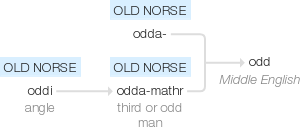Odd
Middle English (in odd (sense 2)): from Old Norse odda-, found in combinations such as odda-mathr ‘third or odd man’, from oddi ‘angle’.
wiktionary
From Middle English od, odde(“odd (not even); leftover after division into pairs”), from Old Norse oddi(“odd, third or additional number; triangle”), from oddr(“point of a weapon”), from Proto-Germanic *uzdaz(“point”), from Proto-Indo-European *wes-(“to stick, prick, pierce, sting”) + Proto-Indo-European *dʰeh₁-(“to set, place”). Cognate to Icelandic oddi(“triangle, point of land, odd number”), Swedish udda(“odd”), udd(“a point”), Danish od(“point of weapon””) and odde(“a headland, point”), Norwegian Bokmål odde(“a point”, “odd”, “peculiar”); related to Old English ord(“a point”). Doublet of ord("point").
etymonline
odd (adj.)
c. 1300, odde, "constituting a unit in excess of an even number," from Old Norse oddi "third or additional number," as in odda-maðr "third man, odd man (who gives the casting vote)," odda-tala "odd number." The literal meaning of Old Norse oddi is "point of land, angle" (related via notion of "triangle" to oddr "point of a weapon"); from Proto-Germanic *uzdaz "pointed upward" (source also of Old English ord "point of a weapon, spear, source, beginning," Old Frisian ord "point, place," Dutch oord "place, region," Old High German ort "point, angle," German Ort "place"), from PIE *uzdho- (source also of Lithuanian us-nis "thistle"). None of the other languages, however, shows the Old Norse development from "point" to "third number." Used from late 14c. to indicate a surplus over any given sum.
Sense of "strange, peculiar" first attested 1580s from notion of "odd one out, unpaired one of three" (attested earlier, c. 1400, as "singular" in a positive sense of "renowned, rare, choice"). An odd job "casual, disconnected piece of work" (1728) is so called from notion of "not regular." Odd lot "incomplete or random set" is from 1897. The international order of Odd Fellows began as local social clubs in England, late 18c., with Masonic-type trappings; formally organized 1813 in Manchester, England.
